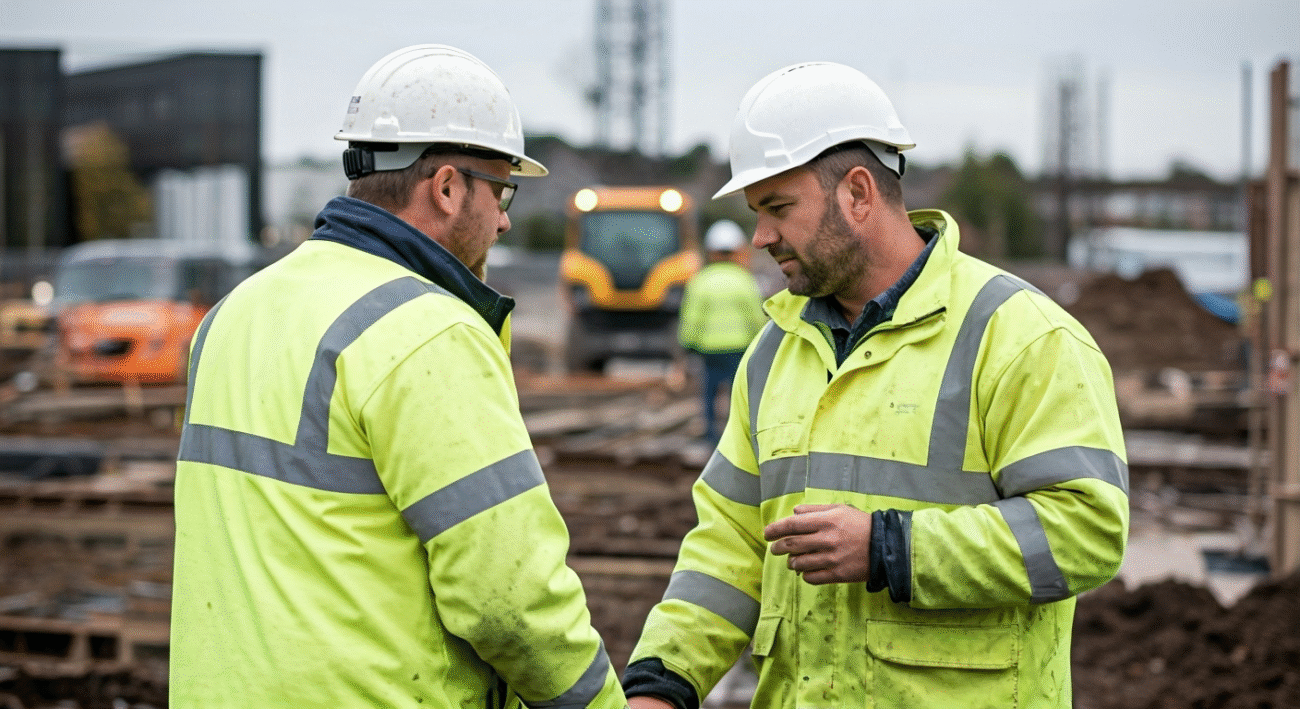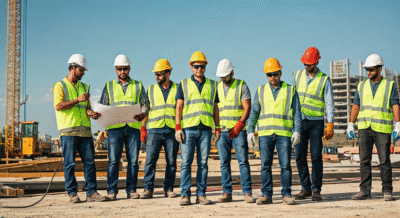Top Construction Safety Jackets in Workwear Clothing: Essential Picks for Safety and Comfort – June 2025 Guide
 Introduction
Introduction
Safety on a construction site is non-negotiable. Among the array of personal protective equipment (PPE), a construction safety jacket is one of the most vital items for any worker. In 2025, technological advancements and strict regulations have revolutionized workwear clothing — ensuring not only maximum protection, but also outstanding comfort and style. Whether you’re a contractor, project manager, or tradesperson, choosing the best construction safety jacket is crucial to prevent accidents and enhance productivity.
Why Construction Safety Jackets Matter
Before diving into our top picks, let’s address why safety jackets are so vital:
- Visibility: Most construction safety jackets use high-visibility (hi-vis) colors and reflective stripes, which make workers stand out in low-light or hazardous environments.
- Weather Protection: Jackets offer resistance against wind, rain, and cold, ensuring focus and comfort regardless of the working conditions.
- Extra Safety Features: Modern jackets often include flame resistance, enhanced breathability, and more—catering to specific jobsite hazards.
- Compliance: Most construction sites now require workers to meet ANSI/ISEA standards, and the right jacket guarantees you’re compliant.
Key Features of Modern Construction Safety Jackets
When shopping for a safety jacket, these features are non-negotiable:
1. High-Visibility Colors & Reflective Striping
Yellow-green, orange, and red hues are most common. The addition of reflective tape ensures you’re visible under lights and in the dark.
2. Durability
Construction sites are tough places. Jackets need ripstop fabric, reinforced seams, and abrasion resistance.
3. Weather-Resistant
Waterproofing, windproofing, and insulation (for cold weather) keep you comfortable and safe no matter the season.
4. Breathability
Look for jackets with mesh linings and venting systems to prevent overheating and excessive sweating.
5. Compliance Certification
Ensure your jacket is rated for the latest ANSI/ISEA 107-2020 or equivalent safety standards.
6. Functional Storage
Deep pockets, zipped compartments, and ID badge windows provide practical storage for tools and credentials.
Top 10 Construction Safety Jackets in Workwear Clothing – June 2025
Let’s break down the top-performing safety jackets for 2025, each excelling in specific categories:
1. Carhartt Hi-Vis Class 3 Waterproof Jacket
Best for All-Round Performance
- Material: 300-denier polyester ripstop with polyurethane coating
- Visibility: Dual 2-inch silver reflective tape, ANSI/ISEA 107-2020 Type R, Class 3
- Weather Protection: Waterproof sealed seams, windproof, fleece lining for warmth
- Extras: Three zippered pockets, detachable hood, adjustable cuffs
Carhartt remains a legend in workwear. This jacket balances unbeatable durability, insulation, and hi-vis protection for all climates.
2. Ergodyne GloWear 8346Z Two-Tone Softshell Jacket
Best for Comfort and Flexibility
- Material: Stretch polyester softshell, water- and wind-resistant
- Visibility: 3M Scotchlite reflective material, ANSI/ISEA 107-compliant
- Design: Form-fitting for unrestricted movement, multiple storage pockets, microfleece lining
Perfect for those who need a lightweight, flexible jacket for fast-paced jobs without sacrificing safety.
3. Radians RW32-EZ1Y Econ Series Rain Jacket
Best High-Visibility Rain Jacket
- Material: Polyester PU-coated, 100% waterproof
- Visibility: Bright yellow-green with reflective tape
- Special Features: Vented back, storm flap closure
Superior option during rainy seasons, ensuring you stay dry and visible.
4. ML Kishigo Brilliant Series Bomber Jacket
Best for Cold Weather
- Material: Polyester shell with quilted thermal lining
- Visibility: Brighter-than-standard hi-vis fabric, contrasting reflective trim
- Weather Protection: Rib-knit collar and cuffs keep warmth in, adjustable waistband
Go-to for sub-zero job sites and winter projects.
5. Portwest PW3 Hi-Vis Two-Tone Fleece
Best Lightweight Fleece
- Material: 100% polyester fleece
- Visibility: Dual-color with reflective tape, EN ISO 20471 Class 2 certified
- Extras: Lined stood collar, side zipper pockets
Ideal for layering or for use during chilly mornings and evenings on-site.
6. JORESTECH High Visibility Safety Jacket
Best Budget-Friendly Pick
- Material: 300D oxford fabric, PU-coated
- Visibility: ANSI Class 3 compliant, multiple reflective stripes
- Weather Protection: Water- and wind-resistant
Reliable, affordable, and meets all safety benchmarks.
7. Blaklader 4892 Hi-Vis Softshell Jacket
Best for Style & fit
- Material: Softshell with stretch for comfort, fleece inside
- Visibility: EN471-certified reflective tape, bright orange/yellow
- Features: Contemporary European fit, ergonomic design
For those who want their workwear to look sharp as well as protect.
8. Helly Hansen Alta Insulated Winter Jacket
Best Premium Choice for Harsh Winters
- Material: Helly Tech® waterproof, windproof, breathable
- Visibility: EN ISO 20471 Class 3, 3M reflective detailing
- Extras: Detachable hood, storm flap, tons of pockets
Exceptionally warm and weatherproof, perfect for extreme climates.
9. DeWalt Pro Hi-Vis Heated Jacket
Best Heated Jacket
- Material: Durable polyester shell
- Visibility: Hi-vis color with reflective tape, ANSI/ISEA Class 2
- Unique: Integrated heating elements, battery-powered with multiple warmth settings
For those in frigid environments or who need to work through the coldest days.
10. Pyramex RJ3210X Hi-Vis Bomber Jacket
Best for Versatility
- Material: Waterproof PU-coated polyester
- Visibility: Bright fluorescent color, dual reflective bands
- Other: Removable fleece liner, detachable hood
Switch from insulated to breathable in seconds—a jacket for all seasons.
How to Choose the Right Construction Safety Jacket
A construction safety jacket isn’t one-size-fits-all. Here’s what to consider:
1. Jobsite Risks
Concrete work, electrical installations, roofing, or roadwork each have unique hazards. Flame-resistance, insulation, or even arc-rated jackets may be necessary.
2. Weather Conditions
Winter sites demand thermal insulation. Summer sites require breathability and moisture-wicking materials.
3. Movement
Do you need a jacket that moves with you? Softshells offer stretch; bomber and rain jackets provide more rigid protection.
4. Storage Needs
Do you carry many tools or paperwork? Opt for more pockets or badge holders.
5. Compliance
Double-check your company and local regulations. ANSI/ISEA 107-2020 is standard, but some localities or sites have stricter rules.
Expert Tips for Maintaining Your Safety Jacket
- Regularly Check Reflectivity: Even durable tape can peel or fade. Replace or patch as needed.
- Follow Washing Instructions: High heat or strong detergents degrade waterproofing and reflective properties.
- Inspect for Tears: Repair any rips immediately to maintain protection.
- Store Properly: Dry, away from direct sunlight to prevent fading and mildew.
Key Trends in Construction Safety Jackets for 2025
The workwear market is seeing rapid innovation. Here’s what’s trending this year:
- Sustainable Materials: More jackets use recycled polyester or eco-friendly dyes.
- Wearable Tech Integration: Some models track exposure to harsh elements or even include smart sensors for health monitoring.
- Lightweight Insulation: Aerogel and advanced fleece linings offer warmth without bulk.
- Custom Fit Options: More brands offer tailored choices for improved comfort and flexibility.
- Direct-to-Customer Customization: Order jackets with company logos, names, or even QR codes linked to safety certifications.
Safety Regulations You Need to Know (2025 Update)
The ANSI/ISEA 107-2020 standard dominates the North American market, specifying requirements for high-visibility safety apparel. European worksites rely on EN ISO 20471. Always ensure your jacket’s certification matches your region and industry requirements—this is crucial in avoiding fines or failed safety audits.
Conclusion
Choosing the best construction safety jacket in 2025 means balancing safety, comfort, compliance, and durability. The jackets featured above represent the pinnacle of modern workwear—protecting you from harm and keeping your focus where it matters most: on the job.
When selecting a work jacket, prioritize hi-vis certification, weather suitability, and proper fit for your tasks. Invest wisely in your comfort and safety, and they’ll pay you back with every safe and productive workday!
Frequently Asked Questions (FAQs)
1. What is the difference between Class 2 and Class 3 safety jackets?
Class 2 jackets are for moderate-risk environments, offering good visibility using less surface area. Class 3 jackets provide the highest visibility, with more extensive reflective material and background fabric, suitable for high-speed traffic and extremely hazardous sites.
2. How often should I replace my construction safety jacket?
It depends on use and wear. Check regularly for faded colors, torn reflective tape, rips, and waterproofing loss. Typically, replace every 12–24 months for daily users or as soon as damage is noted.
3. Can I wash my safety jacket in a washing machine?
Usually, yes—always follow the manufacturer’s instructions. Use cold or lukewarm water and gentle detergent. Avoid bleach, high heat, and fabric softeners, which can degrade reflective capabilities and waterproof coatings.
4. Are there safety jackets designed specifically for women?
Absolutely! Many brands now offer tailored fits for women, ensuring proper comfort and functionality without excessive bulk.
5. What’s the most important feature in a construction safety jacket?
Visibility is paramount—ensure your jacket complies with the latest ANSI/ISEA standards. Comfort, weather resistance, and storage also matter, but if you aren’t seen, you aren’t safe.



